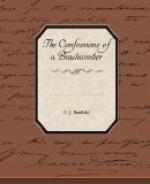It took no long time to make up my mind. Gladly came the determination to abandon the enterprise rather than do violence to the birds. Fortunately a kindly friend took the entire plant and the hives off my hands. We are the worse off in respect of honey; but we have the birds, and the thought comes that there are now hundreds of colonies of bees from the original stock, here and on the mainland, working out their own destinies. Had the enterprise been allowed to flourish, it would have been at the cost of the lives of hundreds of graceful birds; and hundreds of others that now merrily make so free would have been scared away. The money that would have been spent in cartridges is applied to the purchase of honey from foreign parts. No one is much the worse off. Indeed, my friend who purchased the stock is the richer by my abandonment of the calling, and am not I conscious of consistency?
So, these my vocations drift into the gentle and devious stream of inconsequence. It would be vain-glorious, no doubt, to assert that there is placid indifference to vain-glory, which Carlyle declares to be, with neediness and greediness, one of the besetting sins of mankind; but am I not free from the cares that obtrude on those of tougher texture of mind who find joy in the opposite to this peace and unconcern for the rewards and honours of the world? Better this isolation and moderation in all things than, racked with worries, to moan and fret because of non-success in the ceaseless struggle for riches, or the increase thereof; better than to bow down to and worship in the “soiled temple of Commercialism” that haughty and supercilious old idol Mammon; better than to offer continual sacrifices of rest, health, and the immediate good of life to appease the exacting and silly deities of fashion and society.
There may be some who, in a disparaging tone, will at this stage of my confessions enter an accusation of impracticableness. To such a charge I would plead guilty; but to those who proffer it, I neither appeal, nor do I fear their judgment. These writings are for those who see something in life beyond the mere “getting on in world,” or making a din in it.
CHAPTER II
BEACHCOMBING
“For the Beachcomber, when not a mere ruffian, is the poor relation of the artist.”
In justification of the assumption of the title of “Beachcomber,” it must be said that, having made good and sufficient provision against the advent of the wet season (which begins, as a rule, during the Christmas holidays), the major portion of each week was spent in first formal and official calls, and then friendly and familiar visits to the neighbouring islands and the mainland.




